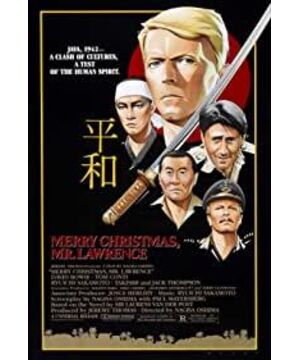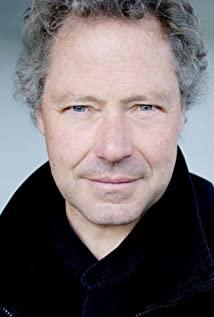Nagisa Oshima's films have that magic, and so does Ryuichi Sakamoto's music. Some people say that if you haven't heard "Forbidden Colours", you will lose a quarter of your life. This clean and sincere "Forbidden Colours" composed by Long Yi, accompanied by David Sylvian's low and desolate voice and lyrics like a rough and warm big hand, hit my heart without error. The most squeamish place. David's voice is somewhat similar to Li Zhi's, which is one of the reasons I noticed him.
Well, I was a little bit face-blind with David Bowie who played Jack and David Sylvian, who made them both named David, so evil, and so manly at the same time Yes, through this film, I finally distinguish these two goods.
Well, Ryuichi Sakamoto was so beautiful back then! I don't want to use handsome to describe him, bad words. With such a pair of big phoenix eyes and a small mouth suitable for being cute, such a beautiful man is a monster (so this film is a collection of monsters, isn't the director Oshima Nagisa also an old monster...).
Stop, stop the nympho, and continue to the topic:
The story takes place in a Japanese prisoner of war detention center on Java Island in 1942. Army Captain Shinojing (played by Sakamoto Ryuichi) and Sergeant Ohara (played by Kitano Takeshi) jointly manage the detention center. As usual, they One sings the red face and the other sings the white face: Ohara is relatively simple and rude, never showing mercy to European and American prisoners of war, and even more so to suppress and humiliate those with homosexual tendencies. And Shi Ye, who is very handsome and literate, is more gentleman, and treats prisoners of war mildly. Colonel Lawrence (Tom Coty), one of the prisoners of war, has a bright and tactful personality, can speak Japanese, and is familiar with the guards, so he can stand in a culturally and politically "opposite". From an angle, come and witness this tragedy.
Some people say that Lawrence is a soy sauce gentleman, the main line of love has nothing to do with him, and he is not in the limelight, so he is not the protagonist at all. But in my opinion, Lawrence is actually the protagonist. Like Shu Juan in "The Thirteen Hairpins of Jinling", he is a witness and witness. He is promoting the development of the whole plot, and is also watching and analyzing the cause, development and ending of the whole tragicomedy. Without Lawrence, the story falls completely loose.
One day, the British Army Major Jack (David Bowie), who was arrested for participating in guerrillas, was transferred to this prisoner of war camp. With his outstanding appearance and temperament, but rebellious, the first time he appeared, he moved the world's ambitions. In the masculine prison camps, people's subtle emotional changes are hidden from the eyes of others. In the days that followed, Jack and Shiye were wandering between domestic hatred and personal feelings, and they were both engaged in hard and cruel wrestling in their hearts.
At the same time, the "dishonest" British prisoners of war, led by Jack and Lawrence, were constantly making trouble for the guards. In fact, many of these "troubles" come from different cultural concepts.
In the eyes of the British prisoners of war, the Japanese were a nation "living in the past", and those ancient and cruel rituals such as belly-cutting, chanting, kendo and the belief in dealing with the emperor's loyalties had no practical significance at all. The Japanese are also an "anxious nation". To constantly "beat the spirit", they simply rely on ideals and beliefs to live. Without the support of ideals and beliefs, the purpose of living will be lost. The Eastern thinking of "the collective is greater than the individual" and the Bushido spirit and shame culture of "it is better to commit suicide" were not understood by the Western soldiers. Facing Ohara's contempt for "If I were you, I would have cut my stomach a long time ago", Lawrence said that being captured is only one of the inevitable experiences of participating in the war. Our prisoners are not afraid of you. As long as there is a chance, we will resist and defeat you. . But Ohara didn't understand these words, "Aren't you still afraid of death, what are you hypocritical about?"
Yonoi, who stands on the opposite side of them, happens to be the representative of traditional Japanese. Ryuichi Sakamoto, who just appeared on the screen, perfectly interprets this young Confucian general with an idealistic temperament from the inside out. Yonoi is very strict with himself and abides by the spirit of the samurai. It seems that he is a serious and unsmiling person by nature. And under such a rigorous and resolute appearance, there is also a sensual heart that may be melted at any time. No wonder the general who took over from him said he was "sentimental". I think, in the heart of Yoyoi, he is still a young man who is just beginning to fall in love.
The death of the Dutch prisoner of war was the fuse that intensified the conflict between the two sides. It's not surprising that the masculinity of POW camps is prevalent. A North Korean guard surnamed Kim fell in love with the Dutchman. After the incident, Ohara asked guard Jin to apologize, but because of delays, the killing was not successful this time. The second time, Guard Kim was dead, but the bloody scene also scared his Dutch friend (let's just say) to bite off his own tongue. Yonoi thought he did nothing wrong, but Lawrence said, "You are wrong, we are all wrong." So Yonoi sentenced all the prisoners of war to fast for two days, and he also fasted with him. During the fast, the prisoners of war learned that the Dutchman was dead, so Jack stole flowers and candles to commemorate him, and brought food along the way. But the unlucky ones encountered a ward round, and Jack was locked up because of this.
Yonoi's guards are going to assassinate Jack, because he sees Yonoi's ambiguous feelings for Jack. Of course, Jack escaped. After explaining the reason, the guard committed suicide.
In this film, the abdomen is cut many times, but none of them are close-ups. In fact, I really wanted to see the close-up, but then I thought about it, isn't it just cutting the abdomen? In a big scene and a big environment, the blood, pain, and death of individuals are all insignificant. I don't know if Nagisa Oshima thinks the same way. Now that he's gone, there's no way to ask, but I understand it that way.
At the guard's funeral, Ohara sat in the middle and recited the scriptures, like an old monk. Yonoi and Lawrence, who sit on either side of him, have the most violent confrontation in the entire film. Lawrence was suspected of hiding a radio in a prisoner of war camp. Yonoi thought that someone must be found to take the blame, whether it was the one who actually committed it or not, so he planned to execute Lawrence. Of course Lawrence refused to do it. He believed that the matter must be found out, and innocent people could not be killed indiscriminately. He looked at the incense case and the tribute, and listened to the endless chanting. He believes that the "strange", "conservative" and "one-stringed" of the Japanese all originate from their unrealistic and extreme beliefs like castles in the air. Of course, the consequence was that he was also locked up.
During the lockdown, Lawrence and Jack truly became confidants because they shared their darkest past. A grieving experience is a magical thing, and just by exchanging it, the feelings deepen. It would be more perfect if the account of this sad past had a touch of contrition. Lawrence needs redemption, so does Jack, maybe love is redemption. The time was set for Christmas Eve, which seemed like the perfect moment for redemption.
They were taken to Ohara's office. Ohara is guarding a table of half-ripe tomatoes and a bottle of rice wine that has been drunk for the most part. He is "drunk like a salamander" (I have always complained about this god-level description), claiming to be Santa Claus, and giving them Christmas gifts that don't have to be Closed again. Because it has been checked, the radio was not brought into the POW camp by Lawrence. The tense atmosphere was resolved, and when Lawrence was about to open the door, Ohara stopped him: "Lawrence! MariChrismas, Mista Lawrence! (Japanese English: Lawrence! Merry Christmas, Mr. Lawrence!)"
Finally, At a time when I forgot what it was, Yonoi had a nerve to get all the prisoners of war together, including those who were in the hospital without arms and legs. "Your body is not sick, but your mind is sick," he said. Ah, I almost scolded the street at the time - didn't you see what kind of virtue those people were? Missing arms and legs, still call the body not sick? Without the support of the body, can it stand completely by the spirit? Idealism is not so sloppy.
The POW commander was nearly shot on the spot for showing disapproval. Maybe it was to save the commander, maybe it was really to use love to influence this idealist, Jack bravely walked towards Shiye after going through a complicated psychological struggle. I don't know if Yonoi knew what was going to happen at the time, but I think he had a hunch because he was about to push Jack away in near panic. When I saw this, I was very sad. I knew what Yonoi was going to say: "Why are you here again? You son of the devil, the snake who seduced Eve, don't bother me again, you know. I can't resist at all, just let me go, I can't be soft-hearted any more"... Shi Ye pushed Jack to the ground, but Jack stood up, walked over calmly, hugged and kissed Shi Ye. It's also like a ritual, love may really redeem everything, no matter what kind of love it is. Shi Ye was so excited that his whole body was soft and heartbroken, because he knew that in this way, he would have to kill Jack. Because he can no longer let the love of his children affect his combat ability and judgment, and he can't betray his country. Shi Ye ordered Jack to be buried alive. When Jack was about to die, Yono cut off a strand of blond hair from his beloved as a souvenir...
Four years later, Lawrence and Ohara, who had switched identities, were reunited in the prisoner-of-war camp where Japanese prisoners of war were being held. The two were overwhelmed with emotion. When they talked about the days four years ago, it seemed like it happened yesterday, and it seemed like a lifetime away. Lawrence learned that Yonoi had been executed by a military court. Before his death, he asked Ohara to send Jack's golden hair back to his hometown in Japan and put it in the shrine as a sacrifice.
Ohara said that Jack is a sower who sows seeds in your heart and we all share the growth of the seeds.
After parting, Ohara called out to Lawrence again, smiled, and tried to spit out the still broken English: "Mary Chrismas, Mista Lawrence (Japanese English: Merry Christmas, Mr. Lawrence)!" The groundhog-like smile is the biggest tear-jerker.
I was thinking that maybe only Nagisa Oshima could handle such delicate things so well. Only under his lens can the actor have such a natural and unique style. I have never been able to resist the story of loving each other and killing each other - a pitiful pair of people who could have loved each other well, but came from a hostile country, and it was destined to be a tragedy in the war years when the love between sons and daughters could never outweigh the hatred of the family and the country.
Is it fate? Japan is a nation that believes in fate, I always think so.
In addition, I think this film, adapted from the British Lawrence Post's novel "The Seed and the Sower", is also a reflection of Oshima's national character, culture, and traditional thinking on Japan. The film is calmly expressed from the perspective of a bystander called "Lawrence", and many of the lines are too sharp. Nagisa Oshima dared to make such a film that exposes the weakness of the nation, which is really bold. This is also one of the things I admire most about him.
&&&&&&&&&&&&&&&&&&&&&&&&&&&&&&&&&&&&&&&&&&&
I don't write reviews, or I don't write reviews at all. I'm just retelling the gist of the story and some details that I think are important, and then adding my own brows. I think a lot of people have seen it.
Writing this kind of "film review" is a painful thing, because I know that without the support of the story, I can't comment, for fear that people who haven't seen it won't understand it. But after writing it like this, I am afraid that those who understand it will not want to watch this film again. After all, my original intention was to recommend this film. So I seem to be facing the enemy in the back and the back, and I have written so much clumsily, just to pay back a wish to myself and show my heart.
Quan Zuo commemorates Nagisa Oshima. At this time when he should have been reunited, he has been unable to reunite since this year.
View more about Merry Christmas Mr. Lawrence reviews











